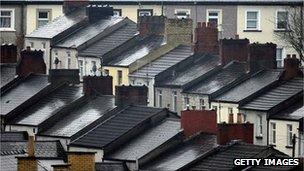Benefits change prompts affordable house shortage fear
- Published

Housing benefits cost taxpayers £20bn a year
Benefit system reforms could mean that in many parts of the UK there will be a shortage of housing for families on a low income, experts have warned.
The Chartered Institute of Housing believes 800,000 homes will become too expensive as a result of changes to benefits which take effect this week.
Caps range from £250 a week for one-bedroom homes to £400 for a four-bed.
Ministers say the new limits on how much housing benefit can be claimed will stop rents spiralling.
Housing benefits cost taxpayers £20bn a year.
The new limits will restrict the maximum amount of housing benefit payable weekly to £250 for a one-bedroom property, £290 for two bedrooms, £340 for three bedrooms and £400 for four bedrooms.
Nobody will get more than £400 a week, which means a maximum of £20,000 a year.
The benefit changes are being introduced gradually since they will affect tenants - as the anniversary of their claim comes up.
The Chartered Institute of Housing said there are likely to be thousands more claimants than properties that are affordable solely on money claimed using local housing allowance, which is the benefit paid to tenants of private landlords.
The professional body for housing fears low income families will be left with the choice of reducing spending on food to pay their rent or moving out.
Its housing experts also warned that, in some regions, it was unlikely that poor people would be able to move to cheaper locations because there would be more claimants in areas with low-cost homes.
Grania Long, of the Chartered Institute of Housing, said: "We've found some very stark conclusions - 800,000 households we expect to be priced out of their own communities and away from jobs, schools and so on."
But the Department for Work and Pensions said that even under the new measures it would be paying claimants up to £20,000 a year in Housing Benefit - so there is no reason why anyone should be left without a home.
Benefit changes to make housing 'unaffordable'
It said the current housing benefit system is unfair, arguing that some families on benefits have been able to live in homes that most working families who do not receive help from the state could not afford.
The DWP estimates that the average loss per week will be £12 and expects many tenants to make up this shortfall or renegotiate their rent.
It said £190m had been allocated to local authorities in additional funding over the course of the spending review period to support vulnerable claimants.
The DWP said: "Early indications are that people are not moving out of cities in their droves to cheaper rural areas. For the vast majority of areas, except the most expensive parts of inner and central London, at least 30% of all private rental properties will be affordable.
"Our measures will place a lid on spiralling rents and local authorities will continue to work with tenants and landlords to negotiate down rents, which will in turn help to keep properties within reach."
- Published25 October 2011
- Published4 November 2010